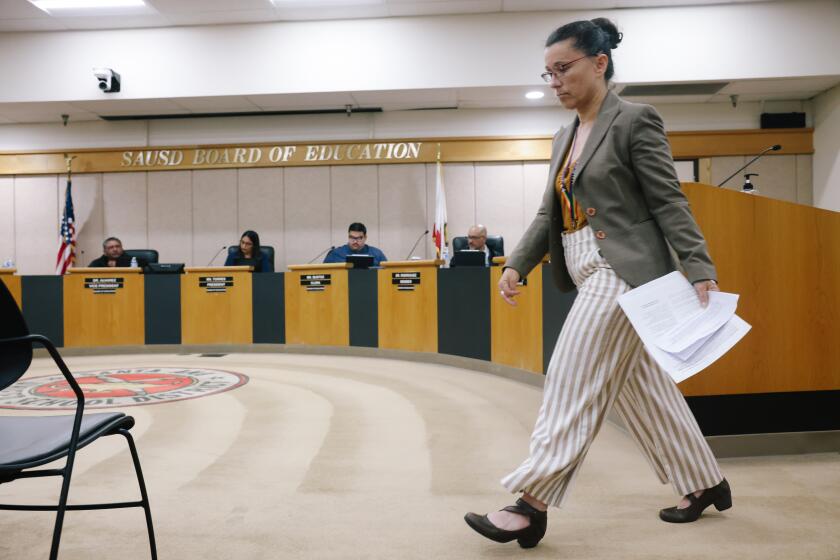‘Like if you won the lottery on 9/11’: How comedian Robin Tran’s life changed in the last year
- Share via
A month before the pandemic started, Robin Tran was sick of doing stand-up comedy so she started learning how to make memes for fun.
She continued posting a mix of stand up clips and original videos on TikTok that resulted in a new following of mostly LGBTQ 20-somethings during a time when comedy events were cancelled indefinitely.
“I’ve had more success in one year in quarantine than my other eight years of stand-up combined,” Tran said.
The 35-year-old, who grew up in Garden Grove, might be recognized from performances in Orange County venues — early 2012 open mic sets about being a 27-year-old virgin or a 2016 duo set “Unconventional Lesbians” performed with her girlfriend, Cate Gary.
Others might recognize Tran from appearances on Comedy Central’s “Roast Battle” or her 2018 one-hour special debut “Don’t Look at Me” on Hulu as part of a six-episode showcase of Asian comics called “Comedy InvAsion.”
“I’ve had to come out a lot, and I was the first employee in my company’s history to come out as transgender,” Tran said in her one-hour special. “Don’t ever be the first employee in your company to ever do anything. It was the worst experience of my life.”
The joke is now available along with the full comedy album on all audio streaming platforms. It covers bipolar disorder, coming out as transgender to her Vietnamese mother, Christmas in a white household and pro wrestling to name a few topics.
Tran, who has since left her 9-to-5 job, spends most days scrolling through Twitter, reading news, writing jokes and making TikTok videos. She’s also starting to perform stand-up sets again, prepping for shows in San Diego next month and Austin in 2022.
In this condensed and edited interview, Tran talks about depression, behind-the-scenes moments of “Don’t Look at Me,” TikTok and getting back on stage.
What has the past year been like for you?
I’ve been talking about how 2020 is the best year of my life, but I wouldn’t be able to say it during 2020 because everyone was suffering so much. I had to hide it from people. The other day on stage I said it’s like if you won the lottery on 9/11.
I was severely depressed for over 20 years and I have bipolar II. I started medication in 2017. I had psychiatrists that just didn’t care about me at all. I was on the wrong medications for a couple years, got off of them because it wasn’t working. In the month where I was on no medication, it felt like I could feel things again, but my mood swings were wild. So I got a new psychiatrist that actually cared about me and I got some good health insurance. My depression completely lifted. I tell people that finding the right medication is the best thing that’s ever happened to me — better than doing stand-up, coming out as transgender or falling in love.
It’s wild that sometimes the difference between life and death is quality healthcare and healthcare workers, but a lot of people don’t have access to it.
When I started seeing my current psychiatrist, I kept thanking her and she said to me, “That makes me so sad that you’re thanking me over something that every doctor should be doing for you.”
She completely demystified bipolar II for me. People either make it this insurmountable thing that they have that they’ll never overcome or they do the opposite where they go, “I’m depressed and it’s because I’m special or I’m a genius.” But she said that having bipolar or having a mental illness is the same as if you had a cold or asthma. You wouldn’t say, “I’m so weak. I need this inhaler.”
Did you have conversations about whether suffering in general serves your comedy and not having it might take away from a performance?
That’s one of the most common misconceptions, and I used to think that too. It’s this old myth of the tortured artist, the sad clown. It’s a very male mentality. When I was super depressed, I had some really funny sets about depression. But I didn’t really talk about anything else because my brain was so focused on my own misery. I’m a very silly person and I finally brought the silliness and absurdity onstage that I was missing for so long. I think you can tell how much fun I’m having, even if I’m talking about something serious.
What was the process of making your first one-hour special “Don’t Look at Me”?
Most comedians would find venues to practice. But I was so depressed, I didn’t do any of that. I would pace around the apartment and say the hour to myself from beginning to end out loud. Then I would just lay in bed for the entire day crying. On the day of the taping, there was a dress rehearsal where I performed the entire hour for a cameraman and no audience. I bombed. I forgot my jokes. I messed up my opener. I messed up my closer. Then two hours later, I had to perform this thing for a packed audience. My girlfriend was opening for me and while she was performing, I thought about making a run for it. But right before I went on stage, I just remembered the worst that can happen is bombing again so just go and have fun. Then I ended up having the best set of my life.
I had a clock on my life. I thought I’m probably going to kill myself, but I want to do something really good before that happens. That’s how I saw the special.
Now that your work process is different with comedy, how do you look back on the special and that time period?
During my first session with my current psychiatrist, she was trying to explain to me how resilient I was. The compliments bounced off me. I didn’t know what she was talking about. I would do a 10-minute roast on Comedy Central and lay in bed for a month. That was how my career went for a while — do one big thing and then I would hide for months. But now I can’t believe how much I did. I’m impressed with myself because I’m stronger than I realized I was.
You’ve become more active on TikTok — not just posting your stand-up clips but also original videos.
I ran out of stand-up clips. I was really panicking because I didn’t know what to post and had 100,000 followers. My girlfriend said, “Make your own content. People want to see your face.” I was like, “No one wants to see my stupid face. There needs to be a microphone and an audience.” I just started doing it because I had no choice.
Some old school comedians say that it’s not real comedy. You try to make a funny 15-second video! I guarantee it’s as hard or maybe even harder than doing a 20-minute set. You have to figure out a way to be funny quickly, which means editing. A lot of comedians will have a four-hour podcast that they don’t edit out calling it a creative choice. But for me, that’s being lazy. Some of the most creative people in the world are on TikTok right now. I’m really excited about it. And it also gets rid of the gatekeepers a little bit.
You’re also starting to go out and perform again. What’s that like after not being onstage for a year?
It felt like an awkward first date. We’re enjoying each other’s company, but I didn’t really know how to do comedy and they didn’t know how to be an audience. It’ll take a while to get used to, but I think it’ll be back to normal again soon. I love stand-up comedy, but I don’t need to do it all the time. I’m OK with doing one really good set and then taking a two-week break to go back to the internet stuff.
All the latest on Orange County from Orange County.
Get our free TimesOC newsletter.
You may occasionally receive promotional content from the Daily Pilot.




